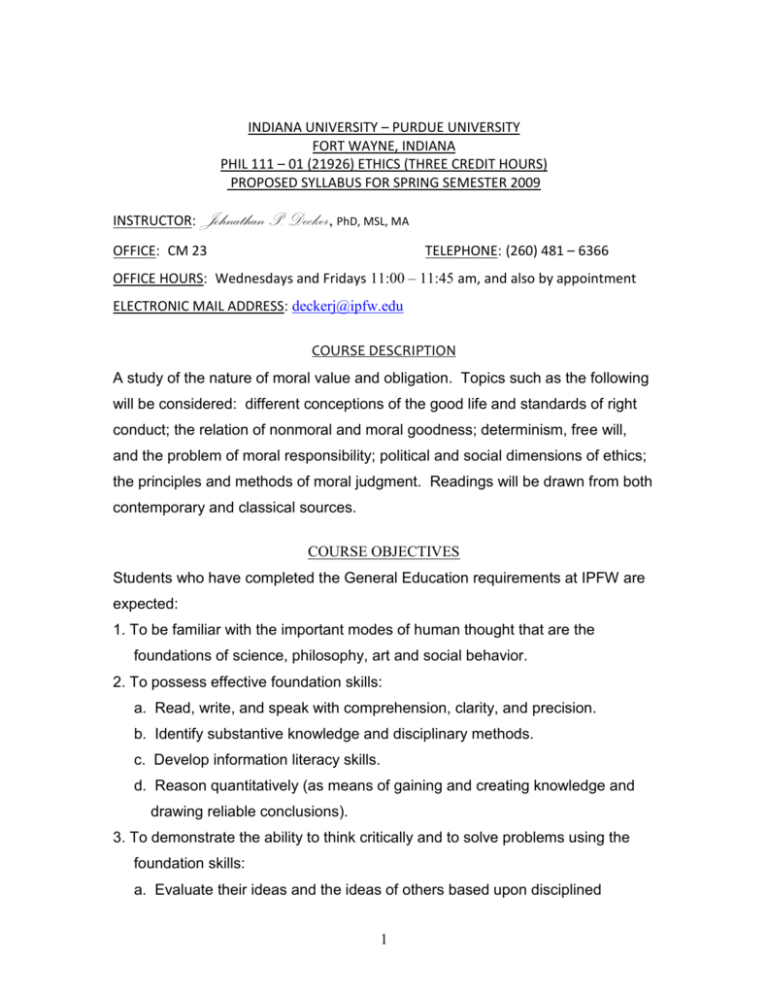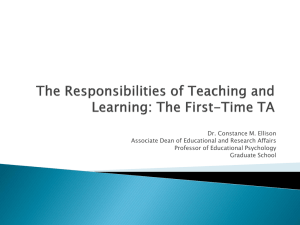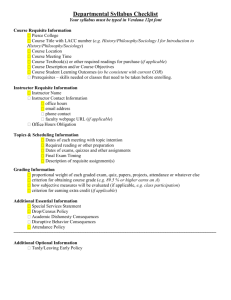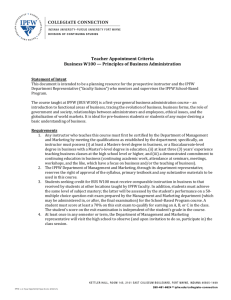
INDIANA UNIVERSITY – PURDUE UNIVERSITY
FORT WAYNE, INDIANA
PHIL 111 – 01 (21926) ETHICS (THREE CREDIT HOURS)
PROPOSED SYLLABUS FOR SPRING SEMESTER 2009
INSTRUCTOR:
Johnathan P. Decker, PhD, MSL, MA
OFFICE: CM 23
TELEPHONE: (260) 481 – 6366
OFFICE HOURS: Wednesdays and Fridays 11:00 – 11:45 am, and also by appointment
ELECTRONIC MAIL ADDRESS: deckerj@ipfw.edu
COURSE DESCRIPTION
A study of the nature of moral value and obligation. Topics such as the following
will be considered: different conceptions of the good life and standards of right
conduct; the relation of nonmoral and moral goodness; determinism, free will,
and the problem of moral responsibility; political and social dimensions of ethics;
the principles and methods of moral judgment. Readings will be drawn from both
contemporary and classical sources.
COURSE OBJECTIVES
Students who have completed the General Education requirements at IPFW are
expected:
1. To be familiar with the important modes of human thought that are the
foundations of science, philosophy, art and social behavior.
2. To possess effective foundation skills:
a. Read, write, and speak with comprehension, clarity, and precision.
b. Identify substantive knowledge and disciplinary methods.
c. Develop information literacy skills.
d. Reason quantitatively (as means of gaining and creating knowledge and
drawing reliable conclusions).
3. To demonstrate the ability to think critically and to solve problems using the
foundation skills:
a. Evaluate their ideas and the ideas of others based upon disciplined
1
reasoning.
b. Understand the traditions that have formed one’s own and other cultures.
c. Be able to articulate their ideas in appropriate media.
To achieve these objectives, by way of secondary objectives, students will be
given;
1. Proper guidelines on how to read, think, write and speak critically and
analytically. Since this is a philosophical class the emphasis will be
largely on rationalism, not so much on empiricism even though not be
completely abandoned.
2. Ample time in class to articulate and freely discuss their ideas defending
them from opposing views and criticisms in an intellectual and civil
manner. Students will be encouraged to learn how to separate issues
from personality in order to promote a friendly and warm atmosphere in
the class.
An opportunity to write their ideas and provide answers for contemporary moral
issues in our society. Students will in no way be penalized for disagreeing with
the instructor, but will be encouraged to prove themselves as good attorneys on
behalf of their views.
REQUIRED COURSE TEXT
THIROUX, Jacques P. and Keith W. Krasemann. Ethics: Theory and Practice
(Ninth Edition). New Jersey: Pearson/Prentice Hall, 2007.
ISBN: 0-13-230213-6.
DISABILITIES STATEMENT
If you have a disability and need assistance, special arrangements can be
made to accommodate most needs. Contact the Director of Services for
Students with Disabilities (Walb 113; telephone 481-6658) as soon as possible to
work out the details.
Once the Director has provided you with a letter attesting to your needs for
modification, bring the letter to me. For more information please visit the web
site for SSD at http://www.ipfw.edu/ssd/.
2
COURSE REQUIREMENTS
1. CLASS ATTENDANCE
All class sessions (Mondays, Wednesdays, and Fridays, 9:00 – 9:50 am) of
each week and examinations will take place in KT 150 unless otherwise changed
by the administration or as announced by the instructor.
Attendance is required for success in this class. It is therefore imperative for
all students to be punctual and stay for the entire period of the class session.
Where there is an emergency, or other prior obligations, absence must be
communicated with the instructor either prior to or immediately after such
absence (on the same day) by phone or electronic mail in order to qualify for
make-up and/or excuse absence.
In the event that a student is absent from class, even with permission from the
instructor, it is that student’s responsibility to secure class notes, and/or
assignment/homework/project from other students in the class. It is
recommended as such especially for those without friends in the class to start
exchanging phone numbers and electronic mail addresses. As a matter of fact,
this will only forge strong interpersonal relationships, which might have lasting
effects.
Those without excused absences may forfeit the opportunity for make-ups or
to turn in work scheduled on those dates he/she was absent. Students are
allowed up to two free absences per semester for emergencies, family and work
related issues during the semester. Thereafter for each additional absence two
percentage points will be deducted from the student’s grade for attendance.
Three tardies, three early departures or five excused absences equal one
absence.
Tardies will be assumed to be unexcused absence unless the student informs
the instructor other wise on the same day at the end of class before the student
and instructor leave the room. To protect the integrity of this process, attendance
will be monitored through out the semester with roll call at the beginning of each
class session.
3
2. CLASS PARTICIPATION
Class participation is expected of and from everyone as this is a very highly
discussion oriented class. Maximum benefit and success from the class would
depend upon the student’s willingness to participate in class discussions and
activities.
Every student is expected to participate in the end of semester course
evaluation. This will form part of the assessment for the grade for class
participation. Those who fail to participate will lose twenty percentage points
from their class participation grade.
3.
EXAMINATIONS
There will be four exams altogether in this class comprising of;
a. Two Tests,
b. Mid-term Examination,
c. Final Examination,
and these will be non-comprehensive units of the course work completed at the
time. Check the course synopsis for dates.
All final examinations will take place in the regular meeting rooms on the date
and time published herein. Notice that there is absolutely no make up allowed on
final exams. This is because as per the registrar; “Instructors must turn in final
course grades within 48 hours after a final exam.”
4. ACADEMIC HONESTY
Refer to the university’s policy in the student handbook/planner part II: Student
Conduct Subject to Disciplinary Action, in particular section A, Academic
Misconduct. Where university standards are compromised in this regard, that
particular student will be dealt with as per the standards/guidelines provided by
the Department of Philosophy and Religious Studies here at IPFW. Please free
feel to contact the Secretary of the department should you be interested in
viewing and/or securing the standards. The contact number is as above.
4
5. READINGS
All assigned readings must be read prior to coming to class. Please refer to
the syllabus for these. The importance of these readings cannot be overemphasized and the student who neglects to read the material prior to class will
be at a great disadvantage in understanding the lectures.
Additionally, a student who has not yet read the assigned material will be at a
great disadvantage in contributing to any discussion that the text and lecture may
warrant. Remember that this is a highly discussion oriented class and every one
is expected to participate in classroom discussions.
Just as coming to the lecture will facilitate understanding the assigned reading
material so will having read the material assigned prior to class better enable
students to understand the lecture. Students should not therefore view the
lecture as a substitute for doing the required reading.
Students should remember that the purpose of the lecture is to consider the
main points of the reading and to raise relevant questions about them. Students
should notice too that they may be tested over assigned material that has not
been covered in class. It is therefore recommended and in the best interest of
the students to highlight the main points of the chapters or pages assigned as
they read, and then re-read the highlighted portions of the work again sometime
after class, and do so in combination with the lecture materials.
6. MAKE-UP
All make-up in this class must be completed by Friday, April 10, 2009, at the end
of the class session. It is the responsibility of the student(s) concerned to make
all the necessary arrangements with the instructor for such make-up(s). Please
remember that instructors like everyone else have superiors to answer to, and
deadline to meet. Your co-operation on this and all other matters relating to the
success of course is therefore very highly solicited.
7. CELLULAR PHONES
The use of cell phones during class session is not permitted. All cell phones
must therefore be turned off in and during class session.
5
METHOD OF EVALUATION
1. Class Attendance
15%
2. Class Participation
10%
3. Test #1
10%
4. Test #2
15%
5. Mid-Term Exam
20%
6. Final Examination
30%
EXPLANATION OF SCALE FOR FINAL GRADE
Beginning Fall 2008, IPFW permitted final grades to be submitted with plusminus grade designations. This action completed the implementation of SD 9811, passed in 1999, by which IPFW conformed to the then newly-instituted
Purdue University grading policy which conformed to the Indiana University
grading policy. This scale provides uniformity in grading for all the universities
involved in the cooperation.
In conformity to the demands of Senate Document SD 98-11, therefore, the
following grades will be assigned as final grades for this course;
A, A+, A- -
Outstanding achievement
B, B+, B- -
Above-average achievement
C, C+, C- -
Average achievement
D, D+, D- -
Below-average achievement;
Lowest passing grade
F
-
Failure
DEFINITIONS
1. COMPLETE WORK
In order to be accepted, every homework, assignment and/or projects turned in
to the instructor for grading must be type written, double-spaced, multiple pages
stapled, with the student’s name on the top right and page number on every
page. Such completed work must be handed to the instructor in class on the due
6
date. No student is allowed to leave anything in the instructor’s mailbox without
prior permission from the instructor.
2. LATE POLICY
All assignments are due in class on the due date and time. Any work submitted
thereafter will be deemed late. The grade for such work will start dropping per
class session. For example, from A to A-, B to B-, and so on.
SKELETION COURSE OUTLINE FOR THE SEMESTER
MONTH/WEEK
LECTURE/DISCUSSION TOPIC
01/12
Classes Begin: Introductions, distribution of syllabus, and course
overview
01/19
Background Studies (Sketching a history of Moral in general and Moral
Philosophy from the earliest beginnings to the present).
No class on Monday, January 19 - Martin Luther King Jr. Holiday
01/26
Definition of Philosophy with an explanation of the Relationship of Ethics to
Philosophy – Chapter 1
02/02
Definitions and Explanation of Critical Ethical Terms – Chapter 1
02/09
Different Aspects of Moral Application - Chapter 1
Friday, February 6, 2009
-
TESTS 1
02/16
Approaches to the Study of Morality - Chapter 1
Concerns of Moral Philosophy - Chapter 1
02/23
Source Problem in Moral Philosophy - Chapter 1
03/02
Source Problem in Moral Philosophy - Chapter 1
Friday, March 6, 2009
-
MIDTERM EXAMINATION
03/09
NO CLASSES
-
SPRING BREAK
03/16
Relativism versus Absolutism - Chapter 5
03/23
The Case for Cultural Absolutism - Chapter 5
7
03/30 The Metaphysical Question of Free will and Determinism - Chapter 6
Friday, April 3, 2009
TEST II
04/06
04/13
Determinism versus Freedom - Chapter 6
FRIDAY, APRIL 10, 2009 LAST DAY FOR MAKE-UPS
Approaches to Measuring and Evaluating Human Behavior
A. Teleological Approaches to Ethics - Chapter 2
04/20
Approaches to Measuring and Evaluating Human Behavior
B. Deontological Approach to Ethics - Chapter 3
04/27
REVIEW for Final Examinations (Students are freed to use
Monday and Wednesday as study days and revision in preparation for
the final examination and bring questions to class on Friday, May 01,
2009 for discussions).
05/01 COURSE EVALUATION (Student participation is very highly
solicited. Please see grade assignment for this).
MON, MAY 4, 2009
08:00 AM – 10:00 AM
FINAL EXAMINATION
SPECIAL NOTICE
Please notice that the syllabus could and would be amended and/or changed
by the instructor as it becomes necessary for the benefit of the class without prior
warning. Notice that this is only a provisional or proposed syllabus.
Students will be warned ahead of time about the days for movies and will be
expected to take notes during the show as this will form part of the questions for
tests and examinations.
Dr. Johnathan P. Decker
Instructor: Spring 2008/09
8







